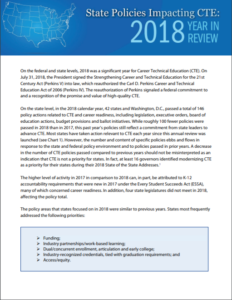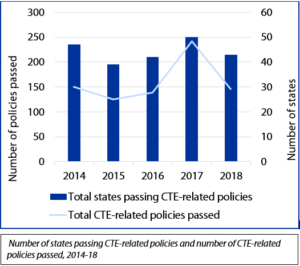 2018 was a significant year for Career Technical Education (CTE) at the federal and state levels. On July 31, 2018, the President signed the Strengthening Career and Technical Education for the 21st Century Act (Perkins V) into law, which reauthorized the Carl D. Perkins Career and Technical Education Act of 2006 (Perkins IV). The reauthorization of Perkins signaled a federal commitment to and a recognition of the promise and value of high-quality CTE. Additionally, at the state level 42 states and Washington, D.C., passed a total of 146 policy actions related to CTE and career readiness, reflecting a commitment from state leaders to advance CTE.
2018 was a significant year for Career Technical Education (CTE) at the federal and state levels. On July 31, 2018, the President signed the Strengthening Career and Technical Education for the 21st Century Act (Perkins V) into law, which reauthorized the Carl D. Perkins Career and Technical Education Act of 2006 (Perkins IV). The reauthorization of Perkins signaled a federal commitment to and a recognition of the promise and value of high-quality CTE. Additionally, at the state level 42 states and Washington, D.C., passed a total of 146 policy actions related to CTE and career readiness, reflecting a commitment from state leaders to advance CTE.
Today, Advance CTE and Association for Career and Technical Education (ACTE) released the sixth annual Year in Review: State Policies Impacting CTE report, examining 2018 state legislative activity, including legislation, executive orders, board of education actions, budget provisions and ballot initiatives. To develop the report, Advance CTE and ACTE reviewed state activity, catalogued all finalized state action and coded activity based on the policy area of focus. For 2018, the top policy areas of focus include:
- Funding;
- Industry partnerships/work-based learning;
- Dual/concurrent enrollment, articulation and early college;
- Industry-recognized credentials, tied with graduation requirements; and
- Access/equity.
In total, 30 states enacted policy in 2018 that impacted CTE funding, making funding the most popular policy category for the sixth year in a row. A number of states directed funding toward the needs of underrepresented, low-income or otherwise disadvantaged populations, including California, Iowa, Maryland, Michigan, Missouri, New Jersey and North Carolina. Washington established a scholarship program to support foster and homeless youth entering postsecondary education or pursuing an apprenticeship, among other policies that supported access and equity, and New York is funding 15 early college high school programs aligned with in-demand industries in communities with low rates of graduation or postsecondary transition.
 While roughly one hundred fewer policies were passed in 2018 than in 2017, this past year’s policies still reflect a commitment from state leaders to advance CTE. A decrease in the number of CTE policies passed compared to previous years should not be misinterpreted as an indication that CTE is not a priority for states. In fact, at least 16 governors identified modernizing CTE as a priority for their states during their 2018 State of State Addresses.
While roughly one hundred fewer policies were passed in 2018 than in 2017, this past year’s policies still reflect a commitment from state leaders to advance CTE. A decrease in the number of CTE policies passed compared to previous years should not be misinterpreted as an indication that CTE is not a priority for states. In fact, at least 16 governors identified modernizing CTE as a priority for their states during their 2018 State of State Addresses.
As states continue to pass CTE related policies, it is important to focus on the quality of the implementation of the policies and not only the quantity. To view the previous years’ Year in Review reports click here. Advance CTE and ACTE will be joined by a state leader to discuss these policies in more depth on February 14 at 2 p.m. EST – to register for the webinar click here.
Brianna McCain, Policy Associate

